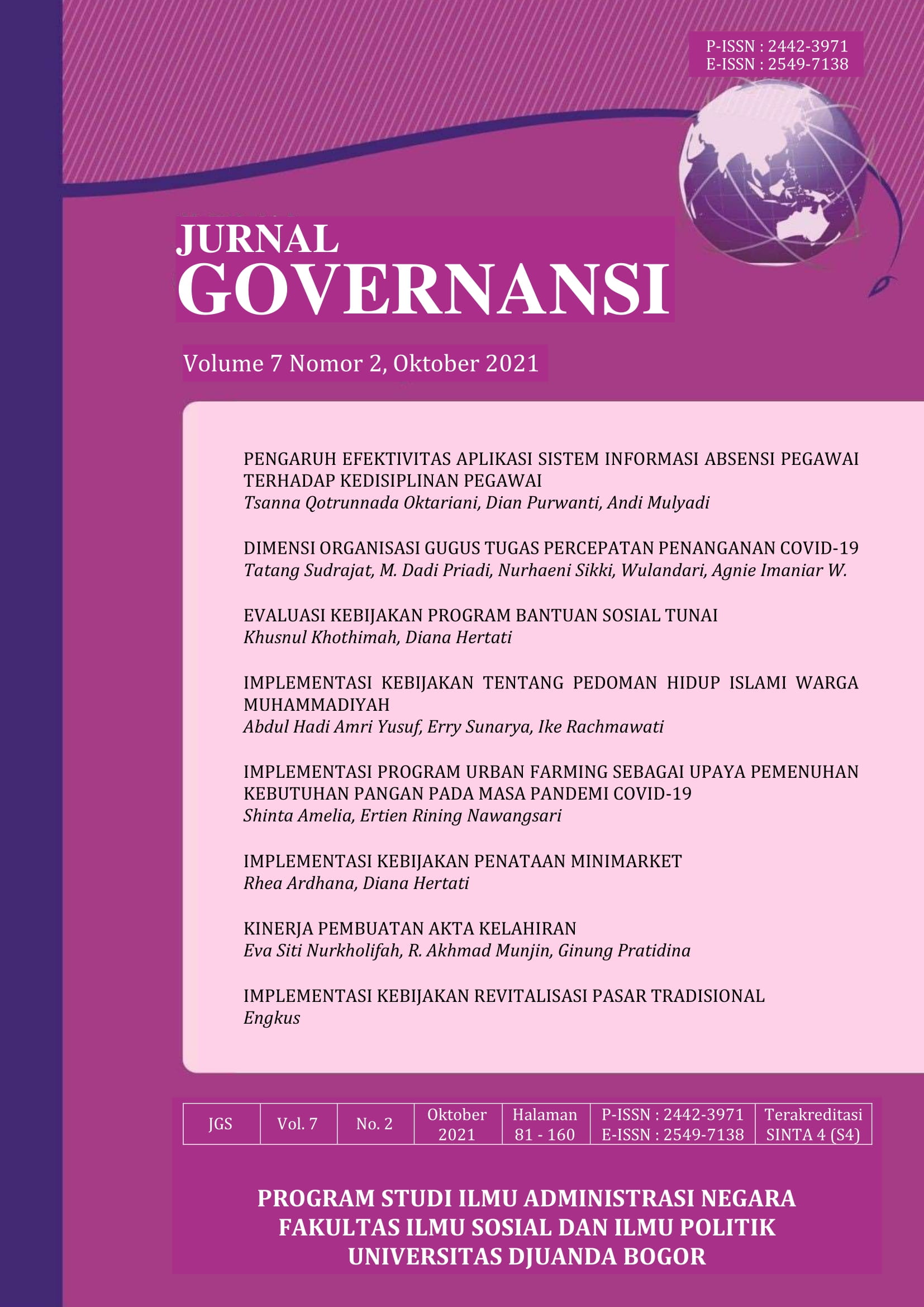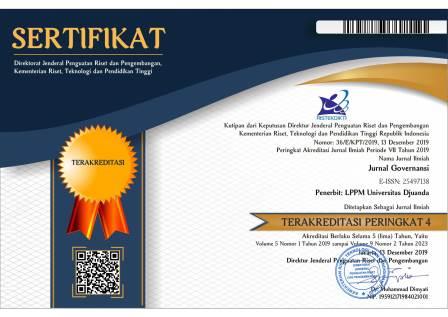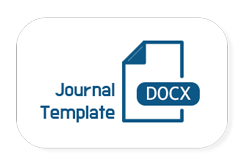IMPLEMENTATION OF POLICIES ON ISLAMIC LIFE GUIDELINES MUHAMMADIYAH CITIZENS (PHIWM) ON EDUCATION PERSONNEL MUHAMMADIYAH SUKABUMI UNIVERSITY
DOI:
https://doi.org/10.30997/jgs.v7i2.4593Keywords:
Policy Implementation, PHIWM, Educational Personnel, UMMIAbstract
The Islamic Life Guidelines of Muhammadiyah Citizens (PHWIM) have not been implemented thoroughly, especially among the education personnel of Muhammadiyah Sukabumi University as one of the elements of Muhammadiyah residents. One of the indications is, there are still education personnel who do not heed the values contained in PHIWM, especially related to managing business charities such as in the last two years there are still delays in entering work and complaints about the performance of education personnel. Thus, the condition is interesting to be used as a research by focusing on the discussion of the implementation of PHIWM policy on education personnel of Muhammadiyah University of Sukabumi. This study aims to analyze the implementation of policies on PHIWM in education personnel of Muhammadiyah University of Sukabumi. The method used in this research is qualitative descriptive method with sampling technique is purposive sampling. The results of this study showed that, the purpose of PHIWM implementation to shape the individual and collective behavior of all Muhammadiyah members who showed good accuracy has not been fully implemented, especially in the educational environment of Muhammadiyah University sukabumi. However, there are several activities that can show a good measure of nudity behavior as an effort in realizing PHIWM objectives such as heeding congregational prayer times, regular study and performance assessment aimed at improving work performance and in accordance with PHIWM values in aspects of life managing business charity for education personnel of Muhammadiyah Sukabumi University (UMMI).
References
Buku
Abdurrahman, Asyumui dkk. (2014). Pedo-man Hidup Islami Warga Muham-madiyah (PHIWM). Yogyakarta: Suara Muhammadiyah.
Agustino, Leo. (2006). Politik dan Kebijakan Publik. Bandung: AIPI Bandung dan Puslit KP2W Lemlit Unpad.
Anderson, James E. (1979). Public Policy Making. Second Edition, Chicago, Holt, Rinehart and Winston.
Edward III, George C. (1980). Implementing Public Policy. Washington: Congres-sional Quarterly, Inc.
Hill, Michael. (1993). The Policy Proses. Harvester-Wheatsheaf; 1st Edition. Edition (1993).
Mazmanian, Daniel A. & Sabatier, Paul A. (1983). Implementation and Public Policy. Glenview, III: Scott, Foresman and Company.
Nugroho, Riant. (2002). Kebijakan Publik untuk Negara-negara Berkembang. Jakarta: PT Elex Media Komputindo.
Satori, Djam’an & Komariah, Aan. (2011). Metodologi Penelitian Kualitatif. Bandung: Alfabeta.
Sugiono. (2013). Penelitian Kualitatif, Kuan-titatif dan R&D. Bandung: Alfabeta.
Suharto. (2010). Analisis Kebijakan Publik. Bandung: Alfabeta.
Taufiqurokhman. (2014). Kebijakan Publik. Jakarta: Fakultas Ilmu Sosial dan Ilmu Politik Universitas Moestopo Beraga-ma (Pers).
Tachjan. (2008). Implementasi Kebijakan Publik. Bandung: AIPI dan Puslit KP2W Lemlit UNPAD.
Winarno, Budi. (2002). Teori dan Proses Kebijakan Publik. Yogjakarta: Media Pressindo.
Jurnal
Van Meter, Donald S. & Van Horn, Carl E. (1975). The Policy Implementation Process, A Conceptual Framework. Administration & Society, 6(4): 445-488. Sage Publications, Inc. https:// doi.org/10.1177/009539977500600404.
Peraturan
Anggaran Dasar dan Anggaran Rumah Tangga Persyarikatan Muhamma-diyah.
Keputusan Rektor Universitas Muhamma-diyah Sukabumi Nomor 1021/KEP/ I.0/A/2020 tentang Revisi Susunan Organisasi dan Tata Kelola (SOTK) Universitas Muhammadiyah Suka-bumi.
Surat Izin Operasional Menteri Pendidikan Nasional Nomor 81/D/0/2003 (Surat Izin Operasional UMMI).
Pedoman Hidup Islami Warga Muhamma-diyah (PHIWM).
Downloads
Published
How to Cite
Issue
Section
License
Copyright (c) 2021 Abdul Hadi Ahad Amri Yusuf, Erry Sunarya, Ike Rachmawati

This work is licensed under a Creative Commons Attribution-ShareAlike 4.0 International License.
Authors who publish with Jurnal Governansi agree to the following terms:
- Authors retain copyright and grant the journal right of first publication with the work simultaneously licensed under a Creative Commons Attribution 4.0 International License that allows others to share the work with an acknowledgement of the work's authorship and initial publication in Jurnal Governansi.
- Authors are able to enter into separate, additional contractual arrangements for the non-exclusive distribution of the journal's published version of the work (e.g., post it to an institutional repository or publish it in a book), with an acknowledgement of its initial publication in Jurnal Governansi.
- Authors are permitted and encouraged to post their work online (e.g., in institutional repositories or on their website) prior to and during the submission process, as it can lead to productive exchanges, as well as earlier and greater citation of published work.



















